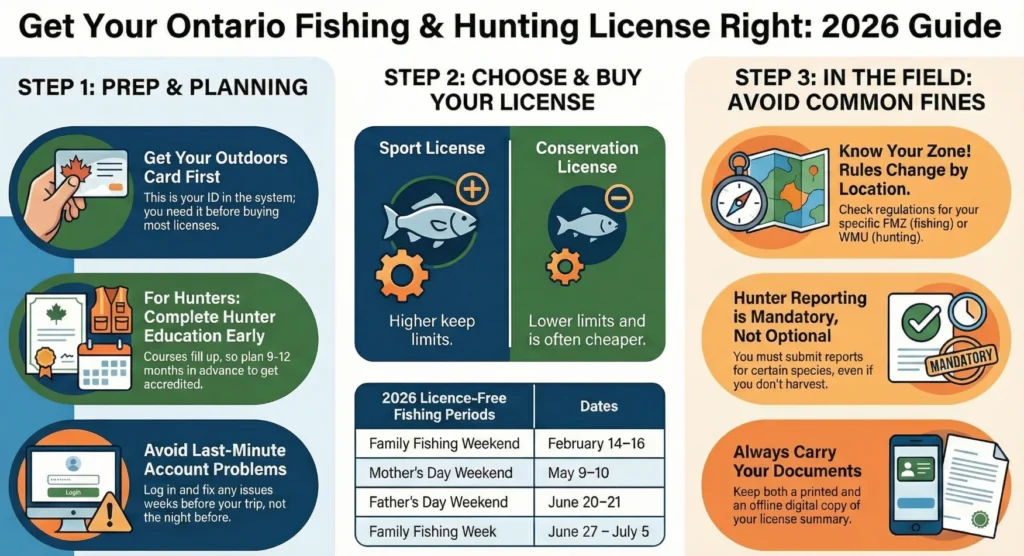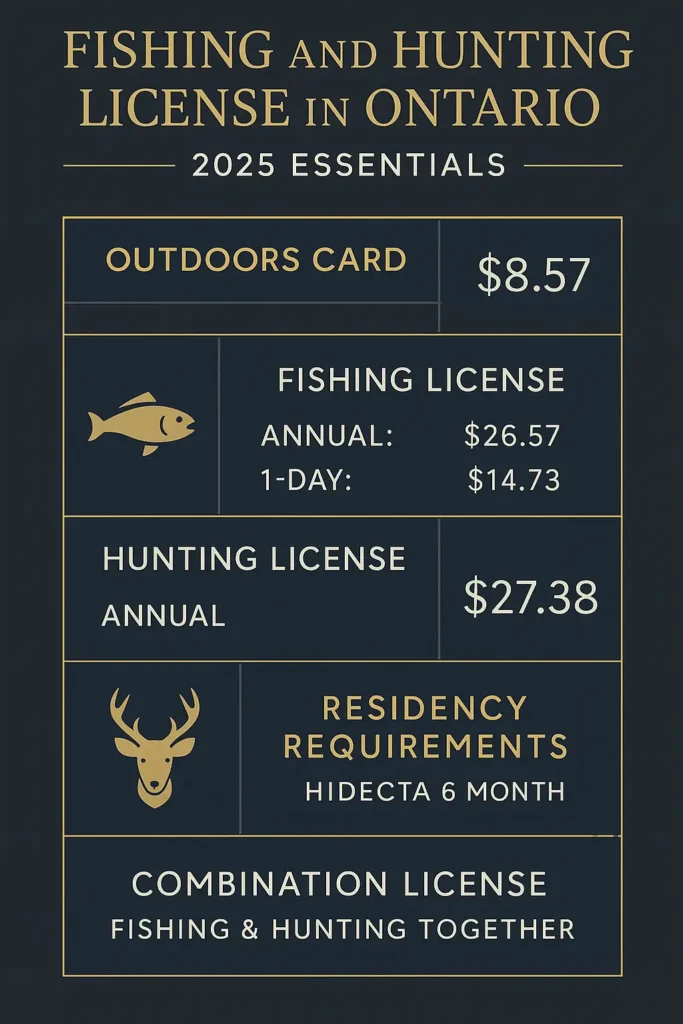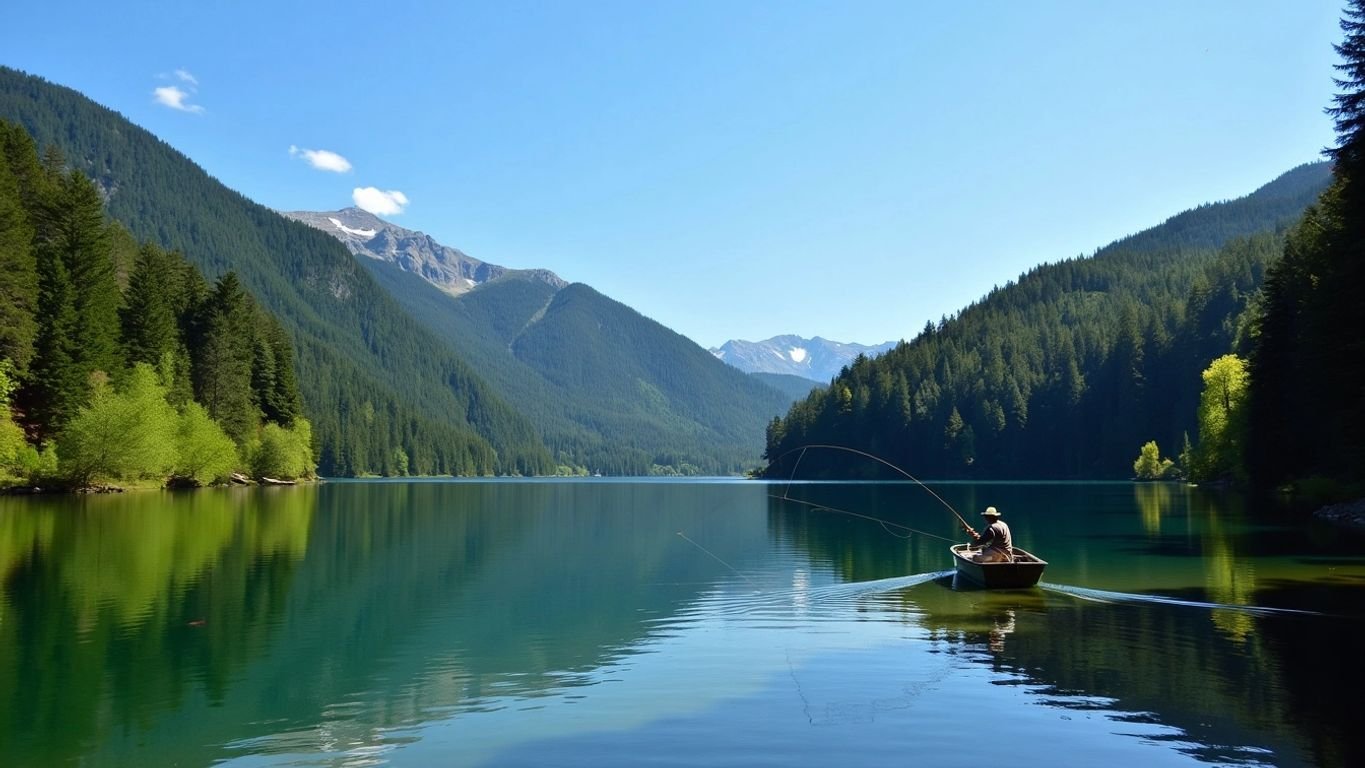Fishing and Hunting License in Ontario in 2026 is easier than it looks—if you follow the right order.
You want to fish, hunt, or do both in Ontario in 2026 without fines, without wasted trips, and without “wait… I needed that?” surprises. Good. This guide is built for real humans, not legal robots.
Important (YMYL-safe): Regulations, fees, seasons, and limits can change. Treat this as an information guide and verify your final details using Ontario’s official resources before you travel.
External official starting points (bookmark these):
- Get an Outdoors Card and licence summary (Ontario)
- Hunt & Fish Ontario (Fish and Wildlife Licensing Service)
- Ontario Free Family Fishing dates for 2026
Quick answers (read this in 45 seconds)
- Fishing: most people aged 18–64 need an Outdoors Card + a fishing licence (unless an exemption applies).
- Hunting: you need an Outdoors Card plus hunter accreditation (usually from Hunter Education), then you can buy hunting products (licences/tags/draws).
- Sport vs Conservation fishing: Sport = higher catch-and-keep limits. Conservation = lower limits, usually cheaper.
- Free fishing days: licence-free does not mean rule-free. Seasons, limits, and zones still apply.
- The #1 way people get in trouble: they buy a licence… then ignore zones (FMZ/WMU) and reporting rules.
This “real-world workflow” angle is one of the big knowledge gaps on competing pages. (That’s why this post exists.)
The 2026 choose-your-path playbook (steal this)
Pick your row. Then follow the steps under it. No guessing.

| Your plan in 2026 | What you must have | What people forget (and pay for later) | My blunt advice |
|---|---|---|---|
| Weekend fishing (Ontario resident) | Outdoors Card + Sport/Conservation licence | Zone rules (FMZ), size limits | Save regs offline before you leave home. |
| Family trip during free fishing dates | No fishing licence for eligible Canadian residents (dates only) | “Free” doesn’t remove limits/seasons | Treat it like normal fishing—just no licence fee. |
| Visiting from another province | Outdoors Card + appropriate fishing licence | Selecting the right residency category | Double-check checkout category before paying. |
| Small game hunting | Outdoors Card + hunter accreditation + small game licence | Firearms requirements (if using a gun) | Do Hunter Education early. Don’t cram it. |
| Big game hunting (deer/bear/moose/elk) | Above + species licence + WMU/tag rules (and sometimes draws) | Draw/allocation deadlines + mandatory reporting | Put deadlines on your calendar like it’s a flight. |
| Combo trip (fish + hunt) | Outdoors Card + fishing licence + hunting products | Mixing zones (FMZ vs WMU) | Keep a “zone note” for each location. |
The planner’s timeline: when to do what (so 2026 doesn’t sneak up on you)
| When | Do this | Why it matters |
|---|---|---|
| 9–12 months out | If hunting: book Hunter Education + start firearm planning if needed | Courses + paperwork take time (and fill up). |
| 4–6 months out | If big game: learn your WMU + track draw/allocation dates | Miss the window and your season can be over before it starts. |
| 1–2 months out | Buy/renew Outdoors Card + buy fishing licence / small game | Gives time to fix account/ID issues. |
| 1 week out | Download/print licence summary + regs; set reminders for reporting | Remote areas = no service. Cold = dead phone. |
| In the field | Carry card + summary; know your FMZ/WMU | Inspections go fast when you’re prepared. |
| After the hunt | Submit mandatory hunter reports (even if unsuccessful) | Non-reporting creates penalties and headaches. |
What “2026” really means (and how not to get burned)
The Outdoors Card system and the buy‑online flow don’t change much year to year. What does change are the details.
Before you spend money or drive anywhere, verify these six things for your exact plan:
- Your dates: seasons can shift, and some species have very specific open/closed periods.
- Your location: your FMZ (fishing) and WMU (hunting) determine limits and rules.
- Your species: “fishing” isn’t one rule; “hunting” isn’t one rule. Species matter.
- Your gear: rules can differ by method (open water vs ice fishing; archery vs firearm).
- Your category: Ontario resident vs Canadian resident vs non‑Canadian resident changes fees and sometimes products.
- Your responsibilities after the trip: reporting requirements and documentation rules still apply after you’re done.
That checklist is the difference between “great trip” and “expensive learning experience.”
Step 1.5: Avoid the stupid account problems (that steal weekends)
Most licensing problems aren’t about rules. They’re about admin.
Here are the common ones—and what to do:
- Name mismatch (passport vs account): fix it before purchase day.
- Can’t log in / locked out: don’t wait until the night before your trip.
- Hunter accreditation not showing: submit your hunter education proof early (don’t assume it’s instant).
- You bought the wrong residency category: stop and correct it immediately. Don’t “hope it’s fine.”
Pro tip: If you’re doing a big trip, buy your products 2–4 weeks early so you have time to fix anything.
The offline pack (the “no signal, no problem” setup)
If you fish/hunt in Ontario long enough, you’ll experience all of these:
- no cell service
- a dead phone in cold weather
- a wet paper copy
- a “can you pull up your summary?” moment
So do this once and you’re set:
- Create a folder on your phone called Ontario 2026
- Save: licence summary PDF, receipts, a screenshot of your Outdoors Card number
- Print one licence summary and keep it in a zip bag
- Put a second copy in your vehicle (glove box)
It’s boring. It also saves trips.
Sport vs Conservation: choose like an adult
Here’s a simple rule that works for most people:
- If you want the flexibility to keep full limits when the bite is hot → Sport licence
- If you mostly catch-and-release or keep fewer fish for meals → Conservation licence
Don’t choose based on ego. Choose based on what you’ll actually do.
Examples:
- You’re bringing kids and keeping a few fish for camp dinners → Conservation often fits.
- You’re doing a once-a-year “fill the freezer” trip (within legal limits) → Sport often fits.
- You’re mostly practicing techniques and releasing fish → Conservation is usually enough.
(And yes: either way, zone rules still apply.)
Hunting planning: three layers people mix up
When someone says “I have my hunting licence,” what they often mean is “I have one piece of the puzzle.”
In Ontario, hunting trips usually involve three layers:
- Provincial licensing products (Outdoors Card + licence/tags/draws)
- Federal firearm requirements (if using firearms, and especially for non‑residents crossing the border)
- Land access (permission, local rules, and safe transport/storage expectations)
If any layer is missing, the trip gets complicated fast.
Affiliate Disclaimer: We may earn a commission from purchases made through the links on this page.
Real-world budget examples (so you can plan money and stop thinking about it)
These are rough examples using the baseline fees below (plus HST and a buffer). Confirm your exact totals at checkout.
- Ontario resident, fishing all year (sport) + Outdoors Card: about “Outdoors Card + 1‑year sport” plus tax.
- Ontario resident, fishing all year (conservation) + Outdoors Card: cheaper than sport by a noticeable margin.
- Non‑Canadian resident, 8–10 day fishing trip: consider the 8‑day option vs 1‑year depending on trip length.
- Ontario resident, small game hunter: Outdoors Card + small game licence, then add any species‑specific licences.
Budgeting isn’t about being perfect. It’s about not being surprised.
One more thing most people forget: what you do after the hunt matters
Ontario’s reporting rules are designed to support wildlife management. That’s the “why.”
So treat reporting like part of the hunt:
- set a reminder the day you buy your tag
- keep basic notes (dates, WMU, effort)
- submit reports on time (even if you were unsuccessful)
It’s not glamorous. It’s responsible. And it keeps your future seasons smooth.
Step 1: Get your Outdoors Card (the thing you can’t skip)
The Outdoors Card is not a licence. It’s your ID card in Ontario’s fish and wildlife system.
You need it for most fishing and hunting products.
Here’s what to expect in real life:
- You create an account.
- You buy/renew the Outdoors Card.
- You buy licences/tags.
- You receive a licence summary (a printable PDF) tied to your profile.
If you can’t produce your Outdoors Card + licence summary in the field, you’re not “done.”
Pro tip: Save a PDF copy to your phone and print one. Cold weather kills batteries. Remote areas kill signal.
Step 2: Choose the right fishing licence (Sport vs Conservation)
Ontario gives you two main choices:
- Sport fishing licence: higher catch-and-keep limits
- Conservation fishing licence: lower limits, often cheaper
Here’s the part most guides skip: the Conservation licence isn’t a “beginner licence.” It’s a management choice.
If you mostly catch-and-release or keep fewer fish, Conservation can be the right move.
License-free fishing in 2026 (yes, dates are already published)
Ontario’s official licence-free fishing periods for 2026 include:
- Family Fishing Weekend: February 14–16, 2026
- Mother’s Day Weekend: May 9–10, 2026
- Father’s Day Weekend: June 20–21, 2026
- Family Fishing Week: June 27 – July 5, 2026
Remember: you still must follow zone rules, seasons, and limits.
Special groups (where people get confused)
Some groups have different licensing requirements or exemptions. Examples can include:
- youth and seniors (age-based rules)
- veterans and active Canadian Armed Forces members (Ontario-resident rules can differ)
- Indigenous peoples with established harvesting rights
- certain persons with disabilities
Don’t rely on a random blog post (including mine) for exemptions. Verify on Ontario’s official pages for your situation.
If you want a general Canada-wide primer before you go deep into Ontario:
Step 3: Hunting in Ontario in 2026 (the clean path)
Fishing is mostly “buy and go.” Hunting is “prepare, then buy, then report.”
Here’s the clean path:
- Hunter Education (or recognized accreditation)
- Hunter accreditation added to your Outdoors Card profile
- Buy your hunting licence(s) and any required tags/draws
- Know your WMU and species rules
- After the hunt: mandatory reporting (where required), even if unsuccessful
If you’re new to hunting planning, start here:
Tags, seals, and draws (the 30-second explanation)
- Small game is usually straightforward once you’re accredited.
- Deer / bear / turkey can be straightforward or complex depending on WMU and tag rules.
- Moose / elk often involve application windows, allocations, and planning ahead.
If your 2026 goal includes moose or elk, don’t wait until late summer to figure out how allocations work. That’s how people lose seasons.
2026 fees: use this as your planning baseline (then buffer it)
Ontario displays fees inside the licensing service (the site currently shows a 2025 fee schedule). Fees can change, so treat these as a baseline for planning and confirm at purchase time for 2026.

Budget rule: take your expected fees and add a 5–10% buffer for 2026 (small increases + HST + unexpected add-ons).
| Product (baseline) | Ontario resident | Canadian resident | Non-Canadian resident |
|---|---|---|---|
| Outdoors Card (3-year card) | $8.57 | $8.57 | $8.57 |
| 1-year Sport Fishing Licence | $26.57 | $55.81 | $83.19 |
| 1-year Conservation Fishing Licence | $15.07 | $33.43 | $52.71 |
| 1-day Sport Fishing Licence (no Outdoors Card required) | $12.21 | $15.21 | $24.86 |
| 3-year Small Game Licence (hunting) | $68.28 | $364.56 | $364.56 |
| 1-year Small Game Licence (hunting) | $22.76 | $121.52 | $121.52 |
| Deer licence (hunting) | $43.86 | $240.81 | $240.81 |
| Black bear licence (hunting) | $43.86 | $240.81 | $240.81 |
| Moose licence (hunting) | $35.29 | $479.86 | $479.86 |
| Moose tag application (primary or 2nd chance) | $15.00 | — | — |
| Elk draw application | $15.00 | — | — |
Note: HST is added to many licensing fees. Confirm total at checkout.
Step 4: Buy, download, and reprint the right way (digital reality)
Most people should buy online because it’s fast and reprints are easy.
Buy/renew + download licence summary:
- Log in to Hunt & Fish Ontario
- Buy products
- Download and print your licence summary
- Save the PDF offline
If you ever lose a printout, reprint from your account. That alone saves trips.
Step 5: The rules that actually get people in trouble (read this twice)
This is where the “I bought a licence, I’m good” mindset fails.
Rule 1: Zones rule everything
Ontario is not “one big rulebook.”
- Fishing rules are tied to Fisheries Management Zones (FMZ)
- Hunting rules are tied to Wildlife Management Units (WMU)
If you move between lakes or properties, you can move between different rules.
Ontario-specific starting point:
Rule 2: Mandatory hunter reporting is real (and it’s a common trap)
Some species have mandatory reporting requirements. The safe move is to assume:
If you hunted a species with a reporting requirement, you report—even if you didn’t harvest.
Set reminders now. Not “later.” Now.
Rule 3: What an inspection looks like (so you don’t panic)
Most inspections are quick when you’re prepared.
They typically want:
- Outdoors Card
- Licence summary
- Proof you’re within limits/seasons for your FMZ/WMU
- Tag/seal compliance if hunting
Make it painless: keep documents together, stay calm, and answer directly.
Non-residents (Canada, US, international): do this first
If you’re not an Ontario resident, your fees and steps can change by category. Don’t guess.
If you’re visiting from the US and hunting with a firearm
Canada has federal border requirements on top of Ontario hunting rules. Many visitors need to complete a Non‑Resident Firearm Declaration (RCMP 5589) and pay the fee at the border (and rules vary by firearm type).
Do not treat this as optional paperwork. Verify federal requirements well before your trip.
Live bait, invasive species, and “but I brought it from home”
This is a common surprise for travelers. Ontario and Canada take invasive species seriously.
Plan on buying legal bait locally and following your zone’s bait and transport rules.
The “don’t ruin your trip” checklist
If you only do five things, do these:
- Buy/renew your Outdoors Card early
- Pick Sport vs Conservation based on what you’ll keep
- Know your FMZ/WMU (zone rules)
- Carry Outdoors Card + licence summary (offline + print)
- If hunting: submit required reports on time
And if you need trip ideas next:
FAQ (5 questions people ask right before they leave)
🎣 1) Do I need a fishing licence for catch-and-release in Ontario?
Yes in most cases. Catch-and-release is still “fishing” for licensing purposes if you’re in the age group that needs a licence. If you rarely keep fish, Conservation often makes sense. Always follow your FMZ limits.
🧾 2) Can I fish in Ontario without an Outdoors Card?
Usually, you need an Outdoors Card before buying most fishing products. A common exception is a 1‑day sport fishing licence option that can be purchased without an Outdoors Card. Verify the current rule inside the official licensing service before relying on it.
🧳 3) What happens if I lose my Outdoors Card or licence summary?
Your licence summary is typically reprintable from your online account. Outdoors Cards can be replaced. This is why buying online is the low-stress move.
📍 4) What’s the fastest way to stay compliant when rules change?
Do a 2‑minute check before you leave: confirm your dates, your FMZ/WMU, and any reporting requirements. Then save your summary + key regs offline.
💸 5) Can I predict 2026 licence fee increases?
Not perfectly. Use the latest published fees as your baseline and add a 5–10% buffer, then confirm final pricing at checkout.
